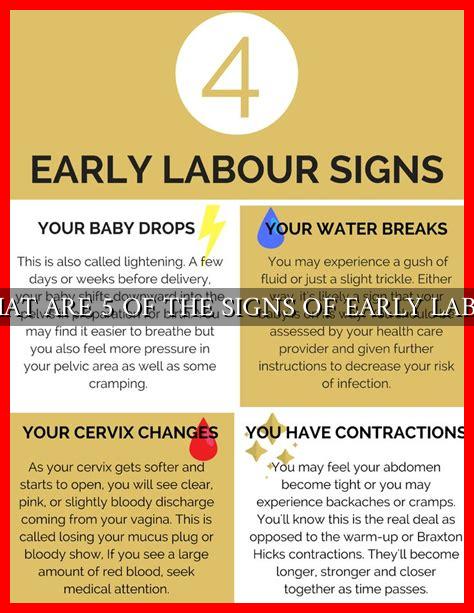-
Table of Contents
What Are 5 Signs of Early Labor?
As expectant mothers approach their due date, it’s essential to be aware of the signs of early labor. Recognizing these signs can help you prepare for the arrival of your baby and ensure a smooth transition to the delivery process. In this article, we will explore five common signs that indicate the onset of early labor.
1. Contractions
One of the most prominent signs of early labor is the onset of contractions. These contractions may start off feeling like mild menstrual cramps but will gradually increase in intensity and frequency. True labor contractions typically occur at regular intervals and become stronger over time. Timing your contractions can help determine if you are in early labor or experiencing false labor.
2. Water Breaking
Another sign of early labor is the rupture of the amniotic sac, commonly known as the water breaking. This can happen as a sudden gush of fluid or a slow trickle. If you suspect that your water has broken, it is crucial to contact your healthcare provider immediately. They will advise you on the next steps to take, as the risk of infection increases once the amniotic sac has ruptured.
3. Cervical Changes
During early labor, your cervix will begin to dilate and efface in preparation for childbirth. Your healthcare provider may perform a cervical exam to assess these changes. As your cervix dilates, you may experience a bloody show, which is a discharge of mucus tinged with blood. These cervical changes are a clear indication that your body is gearing up for labor.
4. Back Pain
Back pain is a common symptom of early labor, as the muscles and ligaments in your lower back begin to relax and shift in preparation for childbirth. This back pain may feel like a dull ache or intense pressure. Some women also experience back labor, where the pain is primarily concentrated in the lower back during contractions. Using relaxation techniques and changing positions can help alleviate back pain during labor.
5. Nesting Instinct
As you approach the end of your pregnancy, you may experience a surge of energy and the urge to prepare your home for the arrival of your baby. This phenomenon, known as the nesting instinct, is a common sign that labor is approaching. You may find yourself organizing the nursery, washing baby clothes, and tidying up the house in anticipation of your baby’s arrival.
Summary
Early labor is an exciting and sometimes nerve-wracking phase of pregnancy. By being aware of the signs of early labor, you can better prepare yourself for the imminent arrival of your baby. From contractions and water breaking to cervical changes and back pain, these signs can help you recognize when labor is beginning. Remember to stay in close communication with your healthcare provider throughout this process to ensure a safe and smooth delivery.


